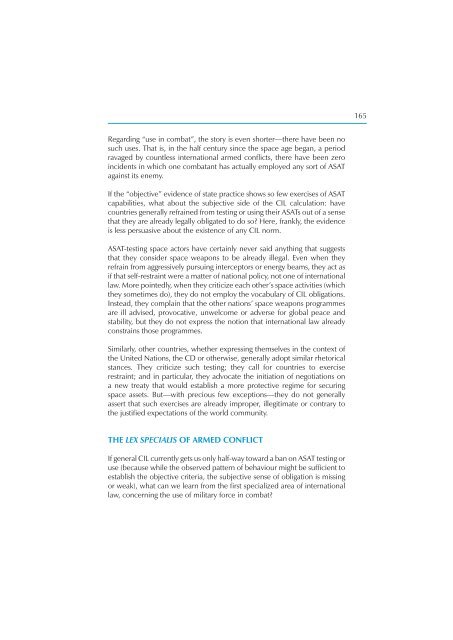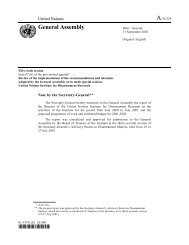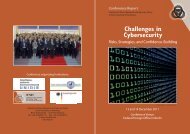Security in Space The Next Generation - UNIDIR
Security in Space The Next Generation - UNIDIR
Security in Space The Next Generation - UNIDIR
You also want an ePaper? Increase the reach of your titles
YUMPU automatically turns print PDFs into web optimized ePapers that Google loves.
Regard<strong>in</strong>g “use <strong>in</strong> combat”, the story is even shorter—there have been no<br />
such uses. That is, <strong>in</strong> the half century s<strong>in</strong>ce the space age began, a period<br />
ravaged by countless <strong>in</strong>ternational armed confl icts, there have been zero<br />
<strong>in</strong>cidents <strong>in</strong> which one combatant has actually employed any sort of ASAT<br />
aga<strong>in</strong>st its enemy.<br />
If the “objective” evidence of state practice shows so few exercises of ASAT<br />
capabilities, what about the subjective side of the CIL calculation: have<br />
countries generally refra<strong>in</strong>ed from test<strong>in</strong>g or us<strong>in</strong>g their ASATs out of a sense<br />
that they are already legally obligated to do so? Here, frankly, the evidence<br />
is less persuasive about the existence of any CIL norm.<br />
ASAT-test<strong>in</strong>g space actors have certa<strong>in</strong>ly never said anyth<strong>in</strong>g that suggests<br />
that they consider space weapons to be already illegal. Even when they<br />
refra<strong>in</strong> from aggressively pursu<strong>in</strong>g <strong>in</strong>terceptors or energy beams, they act as<br />
if that self-restra<strong>in</strong>t were a matter of national policy, not one of <strong>in</strong>ternational<br />
law. More po<strong>in</strong>tedly, when they criticize each other’s space activities (which<br />
they sometimes do), they do not employ the vocabulary of CIL obligations.<br />
Instead, they compla<strong>in</strong> that the other nations’ space weapons programmes<br />
are ill advised, provocative, unwelcome or adverse for global peace and<br />
stability, but they do not express the notion that <strong>in</strong>ternational law already<br />
constra<strong>in</strong>s those programmes.<br />
Similarly, other countries, whether express<strong>in</strong>g themselves <strong>in</strong> the context of<br />
the United Nations, the CD or otherwise, generally adopt similar rhetorical<br />
stances. <strong>The</strong>y criticize such test<strong>in</strong>g; they call for countries to exercise<br />
restra<strong>in</strong>t; and <strong>in</strong> particular, they advocate the <strong>in</strong>itiation of negotiations on<br />
a new treaty that would establish a more protective regime for secur<strong>in</strong>g<br />
space assets. But—with precious few exceptions—they do not generally<br />
assert that such exercises are already improper, illegitimate or contrary to<br />
the justifi ed expectations of the world community.<br />
THE LEX SPECIALIS OF ARMED CONFLICT<br />
If general CIL currently gets us only half-way toward a ban on ASAT test<strong>in</strong>g or<br />
use (because while the observed pattern of behaviour might be suffi cient to<br />
establish the objective criteria, the subjective sense of obligation is miss<strong>in</strong>g<br />
or weak), what can we learn from the fi rst specialized area of <strong>in</strong>ternational<br />
law, concern<strong>in</strong>g the use of military force <strong>in</strong> combat?<br />
165








